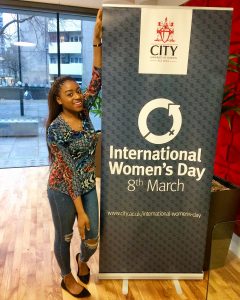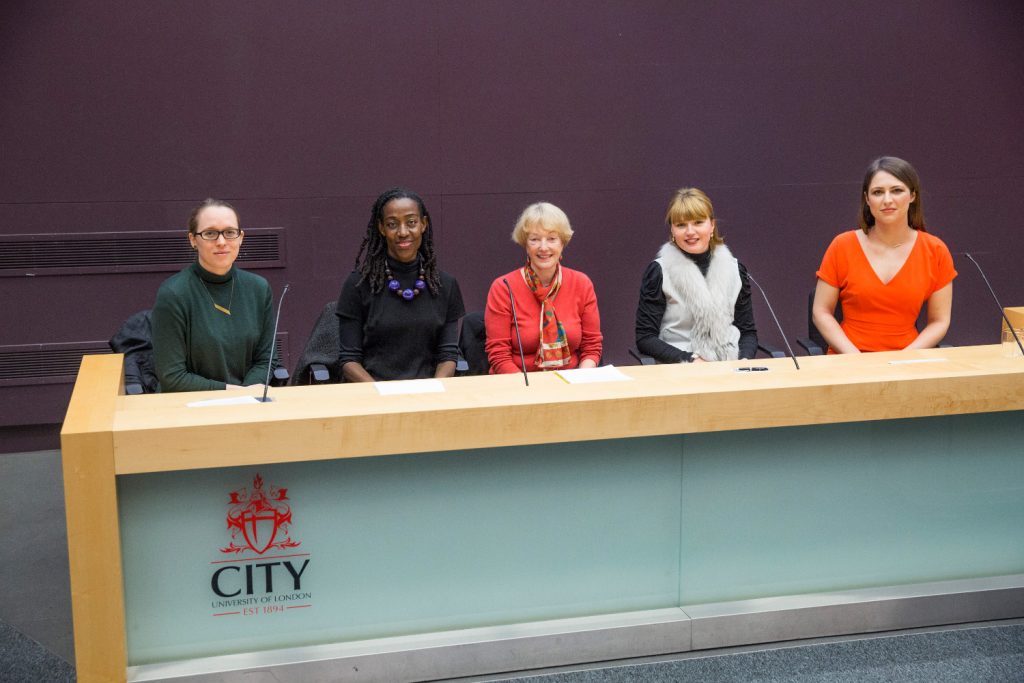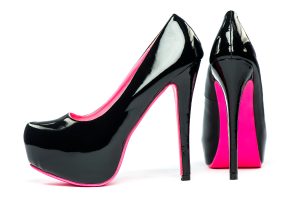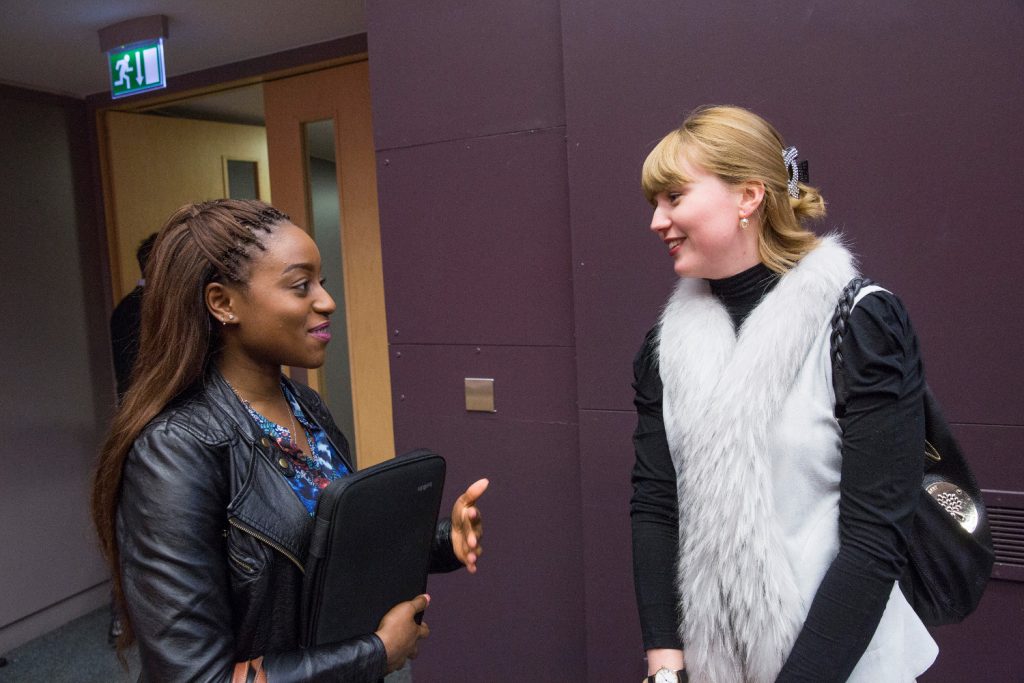Think Looks Don’t Matter? Think Again
 International Women’s Day is a global day celebrating the achievements of women. 2016 saw the acceleration of gender equality which marked a significant year for women. This year, City, University of London invited leading experts to discuss current issues surrounding women’s appearance during the, “Women in the workplace: what does professional look like?” event.
International Women’s Day is a global day celebrating the achievements of women. 2016 saw the acceleration of gender equality which marked a significant year for women. This year, City, University of London invited leading experts to discuss current issues surrounding women’s appearance during the, “Women in the workplace: what does professional look like?” event.
This piece, written by second-year City law student Christianah Babajide, reviews the highlights of the event.
Panel speakers:
Nicola Thorp – Actress and equality campaigner
Angela Jackman – Senior Law Lecturer at City and Partner at Simpson Millar.
Charlotte Proudman – City Alumna, Barrister and Doctoral Researcher at the University of Cambridge.
Dr Florence Sutcliffe-Braithwaite – Lecturer in twentieth century British History, UCL.

Discriminatory Dress Codes
Dress codes are often used in the workplace by employers to communicate a professional corporate image to clients. Often employers will introduce dress codes for health and safety reasons, however, this must not be discriminatory with regards to the characteristics within the Equality Act 2010.
 Despite this, for women in the workplace, it’s centred on looks, not deeds – there have been troubling examples which provide evidence that the Equality Act is not protecting female employees. Examples include Nicola Thorp, who was sent home without pay for refusing to wear two-inch heels (see Guardian editorial). Nicola was a receptionist at PwC who after being sent home, pointed out her male colleagues weren’t required to wear similar attire. Refusing to back down, she launched a petition calling for laws to stop firms from requiring women to wear high heels at work, which attracted 152,420 signatures. As a result of her petition, the Women and Equalities Committee and Petitions Committee invited the public to send other examples of discriminatory dress codes which included; being told to dye their hair blonde, wear revealing outfits and constantly reapply makeup.
Despite this, for women in the workplace, it’s centred on looks, not deeds – there have been troubling examples which provide evidence that the Equality Act is not protecting female employees. Examples include Nicola Thorp, who was sent home without pay for refusing to wear two-inch heels (see Guardian editorial). Nicola was a receptionist at PwC who after being sent home, pointed out her male colleagues weren’t required to wear similar attire. Refusing to back down, she launched a petition calling for laws to stop firms from requiring women to wear high heels at work, which attracted 152,420 signatures. As a result of her petition, the Women and Equalities Committee and Petitions Committee invited the public to send other examples of discriminatory dress codes which included; being told to dye their hair blonde, wear revealing outfits and constantly reapply makeup.
Speaking on the panel, Nicola emphasised this isn’t just about heels, it’s a women’s rights issue and that “women want to be judged based on their experiences, talent and merits.” On a related point, there have been reports of the pain and long-term damage caused by wearing high heels for long periods of time; Voice and Communication Coach, Helen Sewell, stated in the House of Parliament that wearing heels increases your rate of breathing which in turn damages your vocal chords. Therefore, changes to the law are imperative to ensure gender neutral dress codes to enhance gender equality.
Women in Law
Despite the concept of meritocracy being hugely valued in the legal profession, women in Law are not exempt to the sexist dress codes and are also forced to conform to such stereotypes. Human Rights barrister Charlotte Proudman, shamed a senior lawyer over his LinkedIn message on her personal appearance, after he described her photo as “stunning.” Many women share Proudman’s views and would prefer compliments on their merits as opposed to their appearance, and to think otherwise would insinuate good looks are all a woman is good for. Despite facing the possibility of career suicide by publicising the message, standing up for herself and other women was more important to our speaker.

Society has attached a lot to what women wear simply because it is a powerful symbol of what women can do. Controlling what women wear is a way of policing women’s bodies, especially in the legal profession where gender inequality is crippled.
Significance of Choice
Women aren’t given the chance to wear what they want, instead, they are expected to adhere to body fascism. For example, Dr Florence informed us that Muslim women who wear the hijab have had strangers questioning them about what they’re wearing. Angela Jackman highlighted the importance of women having a choice by stating, “if a woman wears high heels and feels confident that’s fine. But that’s why there’s significance in choice.”
She identified challenges BAME communities face in relation to their hair and identity by stating women of colour aren’t given the choice of wearing their hair naturally. Coloured women feel wearing their natural hair to interviews will hinder their chances of getting the job because it is deemed as unprofessional and thus adhere to the European look through a weave.
For example, Pretoria High School deemed afros as a ‘health and safety risk’ thus imposed a strict policy for afro hair. Angela emphasised it is a matter of choice how women of colour choose to wear their hair, whether this be natural or not. On numerous occasions, women have been told to wear a weave or disguise their afro hair, thus the pressure to conform to westernised beauty becomes a struggle they have learnt to accept.
However, if hair is about identity and pride for women of colour, what happens when they are forced to cover it up?
Conclusion
All speakers emphasised the importance of support groups and having a strong network, either in the workplace or outside. They advised against jeopardising your legal career but highlighted the importance of staying true to yourself – you don’t have to accept what’s being thrown at you.
You must be bold because sometimes the challenge is in your head. Take the step forward so it becomes a norm. Be Bold for Change.
